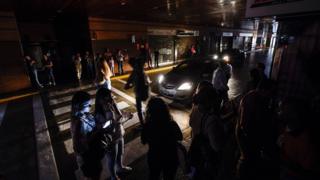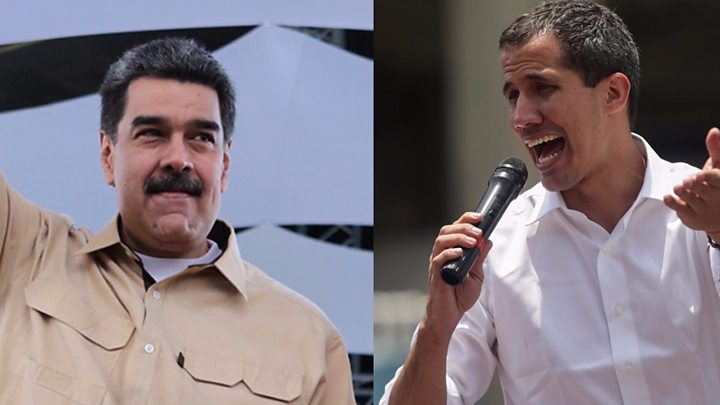 Image copyright
AFP
Image copyright
AFP
Venezuela has been hit by another massive power cut, with the capital Caracas among the areas affected.
It's believed at least 18 of the country's 23 states have lost power.
Information Minister Jorge Rodrigues claimed the power cut was caused by an "electromagnetic attack" and officials were working to restore power.
In March Venezuela was hit by a series of power cuts, including one that affected all 23 states and lasted a week, leading to shortages and riots.
Another outage in April plunged large swathes of the country into darkness; however, that lasted hours rather than days.
Sporadic blackouts are common in Venezuela, where the economy has collapsed amid a political crisis.
President Nicolás Maduro and other state officials have in the past blamed "terrorism" and opposition sabotage, often alleging US involvement.
The opposition, meanwhile, has said the power cuts are the result of years of corruption and underinvestment.
The country's state-owned power company Corpolec earlier reported that a breakdown had only affected parts of Caracas.
Maria Luisa Rivero, a business owner in Valencia in the central state of Carabobo, told Reuters news agency that the thought of another blackout "terrifies" her.
"The first thing I did was run to freeze my food so that it does not go bad like it did the last time in March," she said. "It costs a lot to buy food just to lose it."
What's happening in Venezuela?
Opposition leader Juan Guaidó and President Maduro have been at loggerheads since January, when the former invoked the constitution and declared himself interim president.
Mr Guaidó argued that the elections which had returned Mr Maduro to power for a second term in 2018 had not been free and fair.
Since then, more than 50 countries, including the US and most nations in Latin America, have recognised Mr Guaidó as Venezuela's legitimate leader.
But Venezuela's military - a powerful force in the country - and influential allies such as China and Russia have stuck by Mr Maduro.

An attempt by Mr Guaidó to get the military to switch allegiance to him failed, and the country remains in limbo with both men claiming to be the legitimate president.
Meanwhile, a severe economic crisis has exacerbated and shortages of food and medicines have grown even more acute. United Nations figures suggest four million people have fled the country since 2015.
Venezuela's government blames the shortages on US sanctions but the opposition says they are down to years of mismanagement.
Preliminary talks between Mr Guaidó and President Maduro were held in Oslo in May, but they petered out without an agreement. However they resumed earlier this month, with the Norwegian foreign ministry again acting as a mediator.